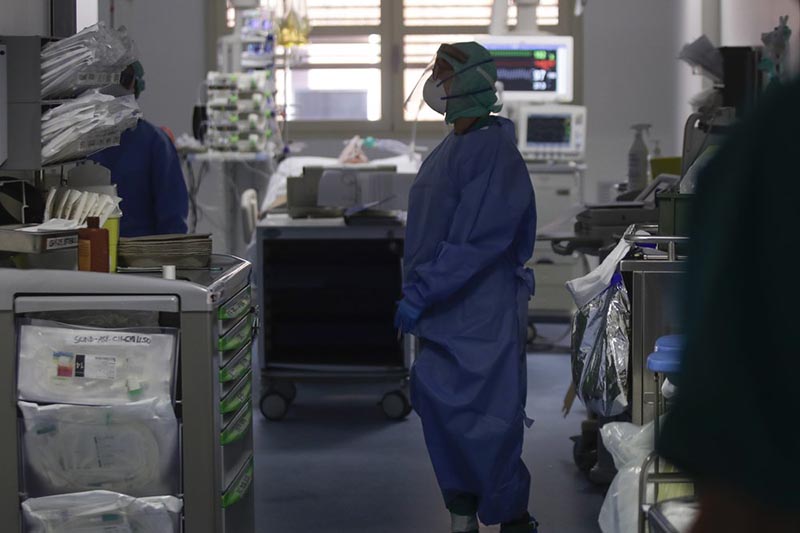A global diaspora of medical workers now looks toward home
JOHANNESBURG: The medical supplies had been shipped. The planning began a year in advance. Then the coronavirus arrived, and Dr. Charmaine Emelife’s heart sank.
The annual trip to Nigeria to provide free medical care — the flagship project of the Association of Nigerian Physicians in the Americas — had been set to start Sunday but can't go on. Now the 4,000-member organization, like diaspora medical groups around the world, is scrambling for other ways to help back home, where it might be more needed than ever before.
A global “brain drain” of medical professionals to richer countries has left developing nations in Africa, Southeast Asia, Latin America and elsewhere without tens of thousands of highly skilled workers. Some 30% of doctors in the U.S., and one-third of those in the UK, were foreign-born as of 2016, according to the Organization for Economic Cooperation and Development.
At the same time, sub-Saharan Africa has a painful shortage of medical professionals, with access to just 3% of the world’s health workers, according to the World Health Organization. Nigeria has four doctors per 10,000 people. Kenya has just two.
But even as some doctors, nurses and others overseas yearn to return to help with the coronavirus crisis, they face travel restrictions that have slammed shut borders and closed international airports.
“There are said to be no commercial passenger flights going into Nigeria from the U.S., and the U.S. is not receiving the same flights,” Emelife, the Nigerian association’s president, told The Associated Press. “The issue of going back to Nigeria at this point to help is not a conversation.”
Instead, the association is raising money to buy and ship protective equipment for front-line workers, reaching far beyond its U.S. base for sources.
When the Ebola outbreak in West Africa in 2014-16 briefly spread to Nigeria, the association focused on sending “tons and tons” of protective gear, Emelife said.
But the task is far more difficult now as the rest of the world competes for the same supplies.
So the association is also exploring telemedicine, Emelife said, in which members can offer long-distance consultations for patients in Nigeria, where some private medical practices have shut down out of caution, further limiting options for care.
“If what is happening in the U.S. or Italy should dare happen in Nigeria, there would be complete, total disorder,” said Dr. Biodun Ogunbo, who closed his private surgery facility in the capital, Abuja, for a month after the country’s first cases were reported.
Currently, Nigeria's cases number nearly 450, but health experts say Africa is just weeks behind Europe and the U.S. in the pandemic and the worst is yet to come.
“It’s the personnel that matter,” Ogunbo said. “We don’t have the numbers of trained medical doctors, nurses, pharmacists” for the 24-hour care that some virus patients need.
For most people, the coronavirus causes mild to moderate symptoms such as fever and cough. But for some, especially older adults and those with other health problems, it can cause pneumonia and death.
The thousands of Nigerian medical workers in the diaspora, Ogunbo said, would “definitely, 100%” be welcome, along with insights into how virus cases are being treated overseas.
Emelife said even such items as soap and clean water are needed in parts of Nigeria. Africa’s most populous nation recently surpassed India with the world’s largest number of people living in extreme poverty.
“We need to help take care of the people at home and we are working on it with this COVID-19 pandemic,” she said. “We love our country.”
Some diaspora groups are appealing to shared culture in this time of isolation.
“Our Filipino values and traits ... will keep us strong and resilient in this trying time,” the National Organization of Filipino American Physicians wrote in a statement on COVID-19. “We are a people that reaches out to and looks after each other.” The group partners with the Manila-based Philippine Nurses Association for online seminars on the pandemic.
The Association of Pakistani Physicians and Surgeons of the UK asked members this month to consult patients in Pakistan via video conference. “Pakistan needs you more than ever before,” it said.
This week, Dr. Sefa Ahiaku updated the website of the Ghanaian Doctors and Dentists Association UK with the obituary of a Ghana-based colleague — “Coronavirus is no respecter of who people are,” she said — and a fundraising appeal to buy protective gear for others in the West African nation.
“For us, the death really brought it close to home,” Ahiaku, the group’s vice president, said. “We want to help out. That desire is more acute when there’s a crisis.”
Ghana, like Nigeria, has locked down certain high-population areas instead of the entire country. The diaspora group hopes to help rural communities “who don’t have the luxury of shutting their doors” improve sanitation ahead of the virus’ possible spread.
“I am really encouraged by the doctors I’m speaking to in Ghana who are keeping a level head,” Ahiaku said, as the country's virus cases near 650.
Her Ghana-based colleague had been talking with the government on ways to streamline the process so medical professionals in the diaspora can come home and offer their services, she said.
She hopes this pandemic might lead governments to invest more in health systems, giving medical workers more incentive to stay at home — or return for good.
In Nigeria, where going overseas for medical treatment is a well-known practice among some government officials, Ogunbo wasn’t so sure.
“I have to say ‘Thank God’ that we don’t have a horrible pandemic” in the country, he said, but it means officials haven’t received the kind of shock that might lead to change.
“They’re not going to come tomorrow and say, ’We need 50,000 doctors, let’s start creating spaces for them, look after them so they’re so comfortable and happy in Nigeria they won’t go anywhere else,” Ogunbo said. “They won’t do that.”






